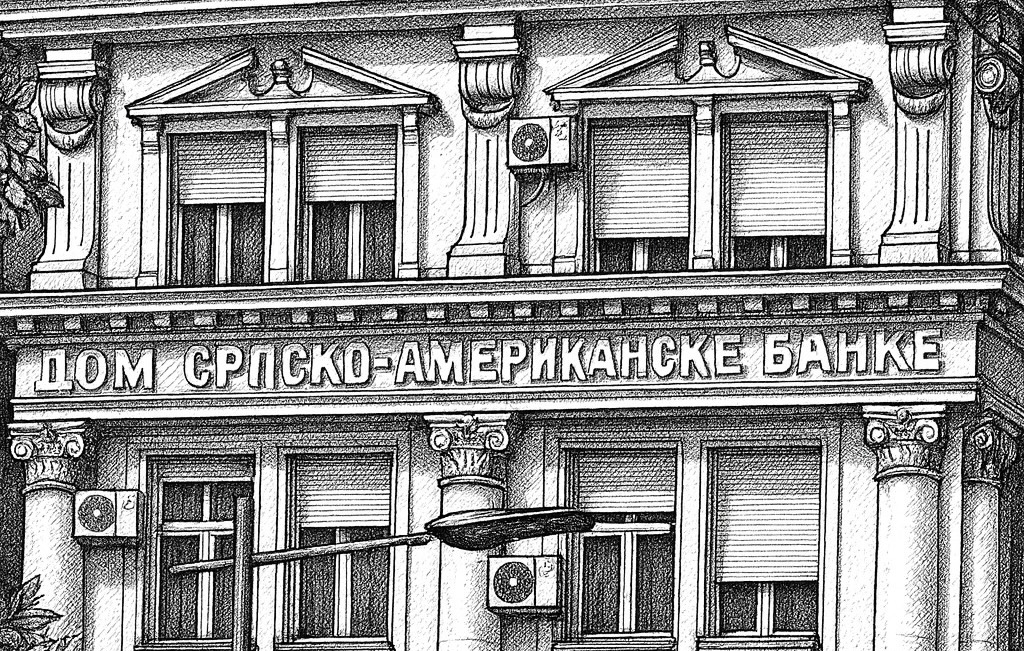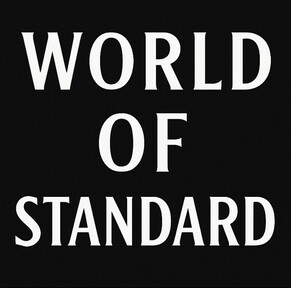Apple Pay arrived in Bosnia and Herzegovina
02.08.2025Written by Miloš Stevanović, attorney
Photo: Detail from one of the pre-war buildings in Belgrade: Serbian-American Bank
Apple Pay Finally Available in Bosnia and Herzegovina – Who Can Use It and What It Means for the Market
Sarajevo, August 2, 2025 – After years of anticipation, the globally popular mobile payment system Apple Pay has officially been made available to users in Bosnia and Herzegovina as of July 29, 2025. With this, BiH has finally joined the list of countries where iPhones and Apple Watches can be used for contactless payments at retail locations, in online stores, and within apps—without needing physical cards or cash. The first three banks to integrate the Apple Pay service are UniCredit Bank, NLB Bank, and Addiko Bank, marking a new phase in the digitalization of the domestic payment market.
A user pays via Apple Pay using an iPhone, without using a physical card.
Service Launch on July 29
Rumors of Apple Pay’s arrival in BiH had been circulating for months, and confirmation came at the end of July: Apple Pay was officially launched in BiH on July 29, 2025. The news was first reported via the Bloomberg Adria platform, with confirmation from multiple sources that the service would go live for selected bank users that day. Some banks had even briefly posted general terms of Apple Pay usage on their websites ahead of time—a clear sign that the launch was imminent.
Indeed, the first Apple Pay transactions in BiH were successfully processed on July 29. This rollout occurred simultaneously with launches in several neighboring markets—Apple expanded the service to other countries in the region that week, including North Macedonia, Kosovo, and Albania. This allowed BiH to catch up with its neighbors in terms of modern payment solutions and formally join the Apple Pay family.
Banks and Cards Supporting Apple Pay
Currently, three banks in BiH have enabled Apple Pay for their clients: UniCredit, NLB, and Addiko. This effectively covers the majority of customers of the largest banking groups in the country. According to information from these banks, specific payment cards are supported—mainly Mastercard, and in some cases Visa as well.
For example, Addiko Bank enabled Apple Pay from day one for users of Addiko Mastercard cards. UniCredit Bank also supported Apple Pay through its mobile app, where UniCredit Mastercard cards can be digitally added to Apple Wallet. Meanwhile, NLB Bank took it a step further—in the NLB Pay mobile app, they integrated Apple Pay and allowed all Visa and Mastercard cards from that bank to be added. This means NLB Visa cardholders can also use Apple Pay, confirming that both major card networks are included in this digital service on the BiH market.
Mastercard officially announced that Apple Pay is now available for Mastercard users at six banking entities in BiH—this includes both Addiko banks (Sarajevo and Banja Luka), both NLB banks, and UniCredit banks in Mostar and Banja Luka. In other words, all three mentioned banks have covered their operations in both entities, allowing Apple Pay access to clients nationwide. In practice, a user simply needs a current account and a compatible card from one of these banks, along with a compatible Apple device, to add their card via mobile banking or directly in the Apple Wallet app and begin paying with their phone.
Other banks in BiH are rapidly working on introducing this service. Reportedly, Nova Banka is already in the advanced stages of preparing Apple Pay support, while Sparkasse Bank has announced plans to launch the service during 2025. ProCredit Bank and Atos Bank in Banja Luka (formerly Komercijalna Banka), along with Intesa Sanpaolo Bank, are actively working on implementation. Raiffeisen Bank—one of the largest banks in the market—confirmed that they are “actively working” on technical implementation but have not yet announced a specific launch date. It’s expected that Raiffeisen, along with the other banks mentioned, will join the Apple Pay network in the coming months, further increasing service coverage.
What Banks and Officials Are Saying
Representatives of the banks that were first to implement Apple Pay highlight this as a major step forward in their digital offering. UniCredit Bank announced that integrating Apple Pay continues its strategy of service digitalization for clients.
“In today’s challenging market, characterized by rapid changes and technological innovations, digital services are not just an option—they are our responsibility. As a leading bank, we are committed to developing innovative, secure, and accessible digital solutions that empower our clients and meet their real needs,” said Amina Mahmutović, CEO of UniCredit Bank d.d., on the occasion of launching the new service.
Spas Vidarkinsky, CEO of UniCredit Bank a.d. Banja Luka, added that Apple Pay is
“yet another step in our mission to make banking as simple and modern as possible.”
NLB Bank states that the integration of Apple Pay is part of the bank’s broader digital transformation.
“Digital solutions are not just a technological step forward for us—they are a way to build long-term trust with clients and adapt to their habits,” said Goran Babić, CEO of NLB Banka Banja Luka, emphasizing that mobile payments are a logical next step in service development.
NLB also noted that client interest in Apple Pay had been growing for some time, which motivated them to be among the first to offer the option.
Addiko Bank also expressed satisfaction, as their clients were among the first to be able to pay using iPhone and Apple Watch.
“We are pleased to be one of the first banks on the market to enable Apple Pay. This innovative payment service will provide our clients with an even better experience, which is especially rewarding for us. Apple Pay is the result of closely listening to our clients’ needs and our commitment to developing modern digital solutions,” said Jasmin Spahić, CEO of Addiko Bank d.d. Sarajevo.
His colleague Slađan Stanić, director of Addiko Bank a.d. Banja Luka, added that clients expect “innovation and the latest digital solutions” from their bank, and that launching Apple Pay confirms that commitment by providing a faster and more convenient payment experience.
Card companies also welcomed the launch of Apple Pay. Jelena Sretenović, director of Mastercard for BiH, Serbia, and Montenegro, emphasized that the arrival of this service carries broader significance:
“The arrival of Apple Pay marks a key step toward the digitalization of the financial sector, enabling Bosnia and Herzegovina to join the world’s most advanced markets and payment solutions. Mastercard users can now enjoy a modern, secure, and convenient way to pay… reaffirming our commitment to promoting innovation in the region.”
Visa also highlighted improved user experience—Ana Drašković from Visa told the media:
“Your wallet is now always with you—in your phone. Apple Pay is an important step toward more modern and simpler financial management.”
Regulatory institutions in BiH did not issue specific statements regarding the launch of Apple Pay, which is unsurprising since the service is implemented via partner banks and does not require separate legislation or permits beyond existing payment system frameworks. However, the Central Bank had previously welcomed all innovations contributing to a cashless society, and public commentary noted that the arrival of Apple Pay is a de facto sign that the domestic banking sector is technologically aligned with the rest of the world.
User Reactions on Social Media
The news of Apple Pay’s arrival immediately generated buzz on social media and among tech communities. Many Twitter and Facebook users shared their excitement about finally being able to register their cards in Apple Wallet and pay with their phones. Screenshots of successfully added cards appeared on the profiles of Bosnian tech influencers, with captions like “From today, I no longer carry a wallet!” and “Apple Pay finally in BiH!”
At the same time, forums hosted discussions about what this move means for banks. Some users shared tips on how to activate the service (just double-click the side button on the iPhone, authenticate via Face ID or Touch ID, and hold the device near the POS terminal), while others used the opportunity to criticize banks that are lagging behind. For instance, one Reddit user frustratedly commented on the absence of their bank with:
“Raiffeisen is the worst… always last in everything,” referring to the fact that Raiffeisen Bank had not yet offered Apple Pay.
Others defended the bank, explaining that integration is complex and that Apple Pay would arrive there soon, calling for patience.
Media outlets also widely covered user reactions. The portal Klix.ba shared the news on its Instagram profile with a photo and caption stating that “with a digital wallet, there is no longer a need to physically carry a card or cash,” which garnered hundreds of likes and comments. The overall tone of responses was a mix of enthusiasm over new capabilities and mild criticism toward slow-moving institutions. Still, most users agreed that the introduction of Apple Pay is a positive change that will make everyday life easier—especially for younger generations accustomed to smartphones in every aspect of life.
The Importance for the Digitalization of Finance in BiH
The arrival of Apple Pay in Bosnia and Herzegovina is seen as a turning point in the digital transformation of the local financial sector. Although contactless card payments had already been on the rise, the integration of one of the world’s most popular mobile wallets provides an additional boost to the shift toward cashless transactions. According to data for 2024, over 186 million card transactions were carried out in BiH, clearly indicating a growing preference among citizens for digital payment methods. Experts predict that the introduction of Apple Pay will further increase that number, as many users who had previously relied solely on physical cards or cash may now switch to a faster and more secure method of payment using a mobile device.
Fintech expert Jasmina Hasić told our portal that Apple Pay in BiH is “more than a technological novelty – it’s a signal of trust in our market.” According to her, Apple included BiH in its global network after all the necessary conditions had been met: a sufficient number of Apple device users, support from banks and card companies, and regulatory alignment for digital payments. “This symbolically places BiH alongside countries that provide their citizens access to the most modern payment solutions,” says Hasić, adding that such a move also motivates other service providers to accelerate the digitalization of their offerings.
The service itself brings multiple benefits for users and the economy. Speed and convenience are its greatest advantages – just hold your phone or watch near the terminal and the transaction is completed in seconds, without the need to search for a wallet or card. Security is also at a high level: every Apple Pay transaction is authorized via biometrics (face or fingerprint) or a passcode, and the actual card number is never shared with the merchant – instead, a unique digital token is used. This effectively eliminates the risk of card data misuse and increases confidence in cashless payments. For merchants, the introduction of Apple Pay means they can serve more customers who prefer this method of payment – from local residents to tourists who already use Apple Pay globally.
More broadly, Apple Pay is another step toward building a cashless society in BiH. Mastercard representatives stated that the use of technologies like tokenization and biometric authentication within Apple Pay represents the pinnacle of security and simplicity for the end user. “Using Apple Pay allows for faster and easier transaction processing, which further contributes to the development of a digital society,” they emphasized. On the other hand, banks have shown through this move that they are keeping up with global trends and are willing to invest in modern solutions that make life easier for clients. Competition in the BiH banking market could become even more dynamic – banks that have not yet introduced Apple Pay are working quickly to do so, so as not to fall behind in service offerings, which ultimately benefits the users most.
Note: Apple Pay is available at all retail locations in BiH where contactless payment is enabled – all that’s required is that the POS terminal supports NFC technology, which is now standard in most stores, supermarkets, cafes, gas stations, and other establishments. The service can be used by owners of Apple devices (iPhone 6 and newer models, all versions of Apple Watch, as well as iPad and Mac computers with additional authorization) in combination with cards from banks that support it. Activation is done through the bank’s mobile application or directly via the Apple Wallet app on the device, following the instructions provided by the banks on their websites. The process is simple and takes only a few minutes – after that, your phone becomes your wallet.
Apple Pay in BiH marks a new step forward in the modernization of finance. With user enthusiasm and the support of key players – banks, card companies, and tech enthusiasts – this launch shows that the local market is ready to embrace global trends and the benefits of modern payment methods. What remains to be seen is how quickly the rest of the banking sector will join in and how widely Apple Pay will be adopted by the general population, but the first few days already show strong interest – and the digital future of payments in BiH has just become the present.
/ / /
"Standard Prva" LLC Bijeljina is a company registered in Bijeljina at the District Commercial Court in Bijeljina. Company’s activities are accountancy, repurchases of receivables, angel investing and other related services. Distressed debt is a part of the Group within which the company repurchases the receivables, which function and are not returned regularly.
Lawyer’s Office Stevanović is the leading lawyer’s office in the region with the seat in Bijeljina. The LO abbreviation represents Lawyer’s Office of Vesna Stevanović and Lawyer’s Office of Miloš Stevanović.
Contact for media press@advokati-stevanovic.com or via telephone 00 387 55 230 000 or 00387 55 22 4444.




